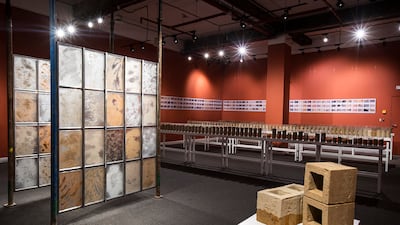An exhibition by Emirati artist Latifa Saeed has opened in Kazakhstan’s Almaty Gallery, where the artist is unveiling a new piece created between the UAE and Kazakhstan. She is the first Emirati to host an exhibition in the country.
Black Silhouette, which will run at Almaty until July 8, was inaugurated by Ammar Albreiki, head of finance administration, consular and nationals services at the UAE embassy to Kazakhstan, alongside several local dignitaries.
Known for her sand-made artworks, the centrepiece of Saeed's latest exhibition is a work titled The Sand Route. The piece comprises two metal structures fitted with glass panels that were handcrafted from the desert sands around Saeed's hometown of Dubai.
The process of bringing together the different components of The Sand Route was intricate and took place between the UAE and Kazakhstan. The glass panels were airlifted from Dubai, whereas the metal structure was designed and assembled in Almaty. The process was overseen by Saeed, who travelled to Kazakhstan in May and collaborated with an engineer in the country to bring the project to fruition.
Black Silhouette also brings together older artworks by Saeed, who is known for utilising various materials in her process including metal, textile, glass and most famously, sand. The disparate media blend harmoniously with influences from Emirati culture and heritage, while highlighting the power of art to transcend geography and communicate beyond language.
Saeed describes Black Silhouette as an artistic endeavour that contemplates past, present and future through metaphors and an archaeological approach.
“The exhibition presents artworks that are the result of meticulous geographic ecological research,” Saeed tells The National, noting how influential the urban and natural landscapes of Dubai are for her work.

“I have ventured into the city, immersing myself in the landscapes to gain a deeper understanding of their essence. The sand archive, a focal point of this exploration, symbolises transience and transformation, encapsulating the shifting nature of our surroundings.”
Besides her interest in exploring the geographic and cultural fabrics of Dubai, Saeed says she is also keen to highlight the collaborative potential between science and art, as well as the power of art to upend biases.
“Other works challenge preconceived ideologies of the Arab World and are dedicated to demystifying stereotypes,” she says. “Through these works I explore the rich and multifaceted tapestry of Arab culture, shedding light on its diversity and complexity.
“Through thought-provoking visual narratives, they invite viewers to question their own biases and engage in a dialogue that transcends borders and fosters understanding. By confronting misconceptions, these artworks empower individuals to forge connections based on mutual respect and appreciation.”
The final artwork of the exhibition is an homage to the UAE’s transformation from nomadic desert life to a nation of extraterrestrial exploration. The work contrasts the UAE Mars Mission with a wall made from desert sand in the UAE.
“The artwork encapsulates the ambition, innovation and relentless pursuit of knowledge that define the Emirati spirit. Through this juxtaposition, viewers are invited to contemplate the profound human longing for exploration and the boundless possibilities that lie beyond our earthly confines,” Saeed says.

Black Silhouette is supported by the City Administration of Almaty, as well as by the Dubai-based Scalo Group – comprising tech venture Scalo Technologies and real-estate enterprise Scalo Properties.
Rashit Makhat, director and co-Founder of Scalo Group, said the company was “immensely grateful to support such a prestigious exhibition”, adding: “It brings us great satisfaction to play a role in showcasing Latifa's extraordinary talent as a versatile Emirati artist, whose work has the power to strengthen bonds between the UAE and Kazakhstan.”
Black Silhouette was curated by Valeria Ibraeva, a renowned Kazakh art historian, critic and author. Ibraeva has worked closely with Saeed for the exhibition since meeting with the artist in her Dubai studio in January. The curator also met other Emirati artists during her visit, including Shaikha Al Mazrou and Mohammed Kazim.
The purpose of the exhibition, Saeed says, goes beyond the display of artworks.
“I would like for this exhibition of Arab artistic expression to become a catalyst for cross-cultural understanding, appreciation and collaboration,” she says.
“Throughout this exhibition, we have met individuals from different backgrounds and engaged in meaningful conversations and forged connections, enriching our perspectives and broadening our horizons.
“In essence, I hope that this exhibition embodies the belief in the power of art as a unifying force, a global language capable of fostering dialogue and understanding. It serves as an invitation for individuals worldwide to partake in this enriching cultural journey, forging connections that transcend barriers. It aims to invigorate the creative scene, inspiring artists to push boundaries, experiment with innovative techniques, and challenge conventional notions.”











